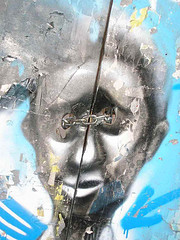
In the Shakespeare group in LinkedIn: trying to argue with someone who holds that there is no evidence to connect "the Stratford businessman" with "The Globe Theatre", that lots of other works have been unduly ascribed to Shakespeare anyway, that William Herbert and Mary Fitton wrote the sonnets... But one might as well discuss the angel Mormoni with a moron.
I begin rather hopefully though, with the basics on this issue:
—I will just note that this issue is a celebrated addle-brained locus, comparable to UFO abductions etc. It is not an issue at all in Shakespeare scholarship - the one done by scholars, I mean.
... but the argument goes on:
Well, all this has been said before, but anyway. The Sonnets were signed on the front page of the 1609 Quarto, but they were signed by Shakespeare, not by Mary Fitton or William Herbert. I am not aware that anyone is trying to ascribe "Sir John Oldcastle" to Shakespeare any longer. As to "The Passionate Pilgrim", we know it was a piratical venture which gave rise to Shakespeare’s protest and to a cancellation of the title page.... etc. Can you show the "signatures" on the sonnets you mention? I confess they are beyond my interpretive powers.
(...)
—The logic behind your theory is wobbly. Why assume that a well-known author known as William Shakespeare to all his contemporaries shouldn’t be the author of a work called Shake-Speare’s Sonnets, given that none of his contemporaries ascribes the poems to Herbert, and all known testimonies ascribe the poems to Shakespeare? You might as well argue they were written by the Earl of Southampton. Why not? Or by Francis Bacon. Or by Queen Elizabeth, they might be posthumous. Or you might assume (perhaps you do) a gigantic plot by hundreds of unrelated people to make the world believe that there was someone born in Stratford called Shakespeare, that he made a fortune as actor, playwright and theatre owner in London... all a gigantic fiction! And perhaps his friend Hamnet didn’t exist either. Why shouldn’t we think so?
Oh—and we haven’t seen the signatures in Sonnets 121 / 123 / 124 yet.
(...)
—Backward-reading indeed—and you think you find a bit of Mary Fitton’s name somewhere in the Sonnets. But you may as well go and read the Bible backwards, and no doubt you will find some lonely insight about its Shakespeare, or Oxfordian, authorship—somewhere. You say there is no documentary connection between the Stratford Shakespeare and a famous London playwright. Well, I’m afraid you need to do some serious reading, which I can’t do for you. I can only advise you to go and begin with the introductory material to the First Folio, or go and read Shakespeare’s monument at Stratford. Otherwise, I can’t think I can be of much help, so I’ll just wave good-bye to this discussion.
But he still goes on: "Nowhere does it say Shakespeare’s monument. The words are Stratford moniment which could just as well mean muniment, a place where old documents and books are kept. Too many people hide behind rhetoric and bluster, show me the evidence I asked for - I know you cannot."
—This is really getting too silly, Ben. Leonard Digges’s poem, which speaks of "thy Stratford moniment", is addressed to "To the Memorie of the deceased Authour Maister W. Shakespeare", in a volume of his works performed by the King’s men and published by two members of that company. If you are trying to play some kind of joke please quit because I’m stopping here. And if you aren’t... well then God help your wits. I can only wish that in your everyday life you are better than this at reading evidence. All best wishes, anyway.
(Makes you skeptical about online discussion groups, yes it does).
—oOo—

No hay comentarios:
Publicar un comentario
Se aceptan opiniones alternativas, e incluso coincidentes: